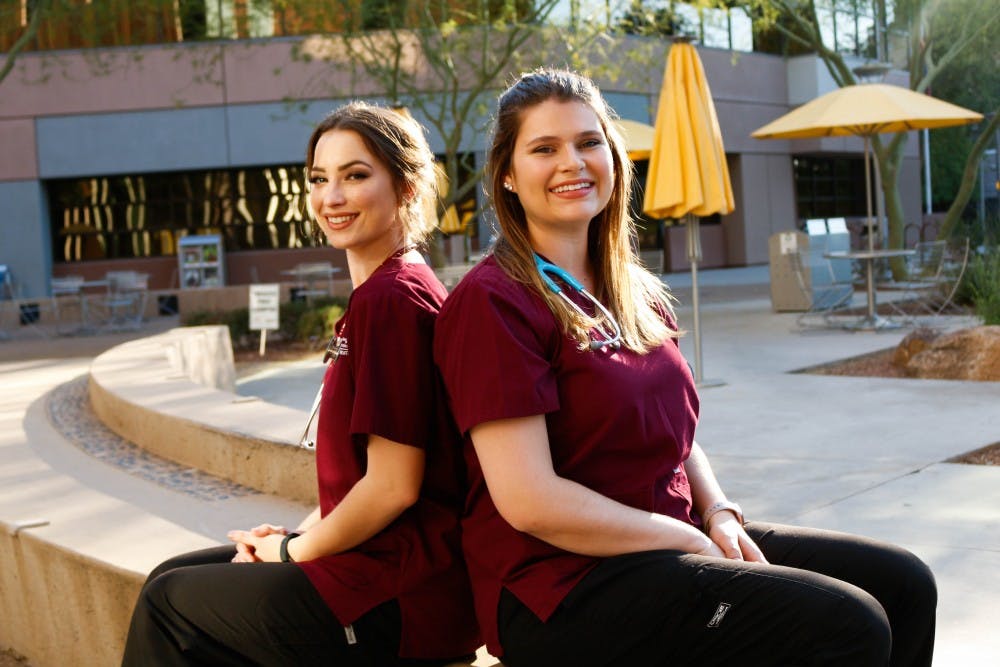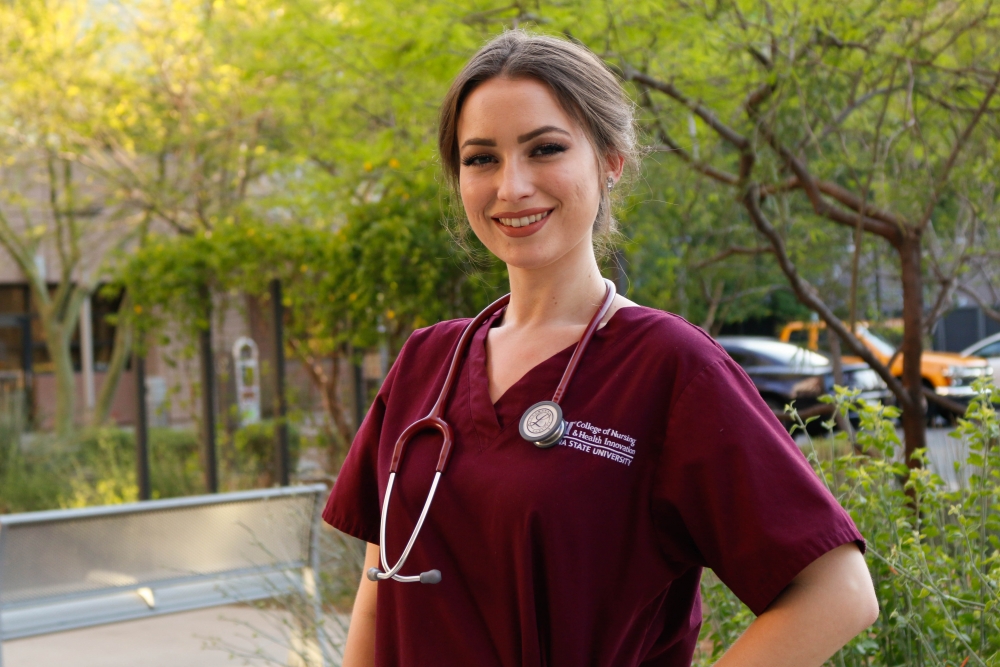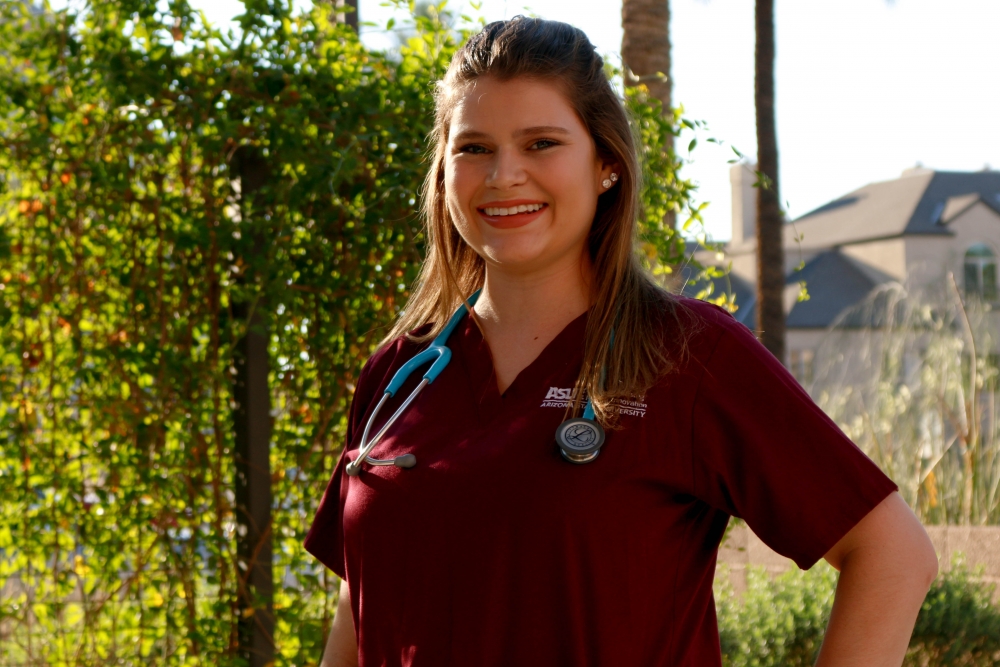In the middle of 24-hour clinical nursing rotations and classroom exams, nursing students Zia Tyree and Marina Birch quietly made history. With the click of a button and a focus on Down syndrome awareness, the pair is the first at Arizona State University to pursue potentially impacting policy at the National Student Nurses' Association.
Tyree and Birch created a resolution that aims to reduce stigma and increase early education. When they present their research at the NSNA's annual conference this April in Dallas, Texas it will be the accumulation of a year's worth of effort.
“The feeling of actually hitting that submit button was surreal. It was something that we had been working on for such a long time,” Tyree says. “The conception of the idea happened in August, and by the time we go to the conference it will be April. This will be a year-long process. Just being able to have opportunities to talk about people with Down syndrome has made it all the more worthwhile.”
Their campaign is made more personal through Birch’s brother Austin Birch. He is the inspiration for the resolution and the heart that drives the duo to fight for Down syndrome rights.
“My older brother has Down syndrome,” Birch says, “He is my best friend in the whole world. The stuff he has been through sparked why we wanted to do this and bring a light to the situation.”
As co-authors of the resolution, Tyree and Birch aim to help people look beyond a generalized stigma and see capable individuals.
“We are trying to use person-first language,” Tyree says. “Personal first language is saying that ‘Oh, he’s 12, and he happens to have Down syndrome.’ He’s a 12-year-old boy first. He’s not down syndrome first. It’s putting the person first, not the diagnosis.”
Tyree and Birch believe that the best way to reduce stigma is through an increase in early education. They understand that both families and medical personnel alike need better access to educational resources.
“We learned from all of our research that the information is out there, but not in our nursing textbooks,” Birch says. “If nurses are not getting that education, how do we expect the patients to get it?”
Tyree and Birch know the positive effects that come with furthering early education efforts. Birch looks to her own family’s experience to attest to the importance of empowering families.
“My mom was really luckily,” Birch says. “One nurse had a child with Down syndrome that came in and educated her. She was lucky because she had someone who was previously educated on it. Not everyone is getting that experience. Getting someone educated like that is amazing because they can in turn provide that education to families.”
Now Tyree and Birch are acting as advocates for patients with Down syndrome. They have made it their mission to showcase the scope of people the disability impacts.
“There are about 600,000 people living with Down syndrome in the United States,” Tyree says. “It can affect you more than you realize.”
By helping others to understand the widespread reach of the disability, Tyree and Birch hope to bring awareness to the nursing community.
“You are going to be seeing it so much in any field you’re working in nursing,” Birch says. “It’s important that everyone gets that education and everyone realizes that stigma.”
Once presented, the NSNA has the option to pass the resolution, making the contents of the resolution a priority for the organization. If passed, the resolution could affect national policy.
“The American Nurses Association takes an interest in what the NSNA has to offer,” Tyree says. “If you get a resolution that passes then the ANA might actually help enact something that you passed. It’s crazy to think that two girls from ASU Downtown can make an impact at the national level.”
The historical impact of Tyree and Birch’s resolution has not gone unnoticed. ASU clinical professor Cheryl Schmidt is proud of the work the pair has put into their research.
“I have been so impressed with the work that Zia and Marina have done on their resolution related to Down syndrome,” Schmidt says. “I have served as the Consultant to the National Student Nurses' Association Resolutions Committee since 1985, and am proud that our ASU students have developed one of the 75 resolutions to be considered at this year's House of Delegates.”
Tyree and Birch’s unmatched dedication stems from their personal experiences with Down syndrome.
“Every single day I think about Marina’s brother,” Tyree says. “He’s the most loving and incredible person. If he can be so fulfilled, I want other people to know that he can be fulfilled and can make an impact.”
Birch’s brother inspires her to work in the nursing field as an agent for change.
“My brother had a lot of different health issues because of the Down syndrome, and I had some myself,” Birch says. “Getting those really good experiences with the nurses was really an inspiration to want to do that for others. You are not at the hospital when you feel well. There was someone for me — I want to be there for someone else.”
Above all, Tyree and Birch strive to emphasize the impact nurses can have.
“It’s something that you don’t just leave in the hospital or that you leave in the classroom,” Tyree says. “We are advocates for health, well-being, inter-professional communication. We are advocates for healing communication. Nurses don’t just give out meds and say ‘Hey your doctor will be in in a minute.’ People don’t realize that, until they’re hospitalized or something happens to them unfortunately, that nurses are the front lines of the health industry. The realization that we can make such an impact together as a nursing society is unreal.”
Reach the reporter at Madison.Staten@asu.edu or follow @madisonmstaten on Twitter.
Like State Press Magazine on Facebook and follow @statepressmag on Twitter.






